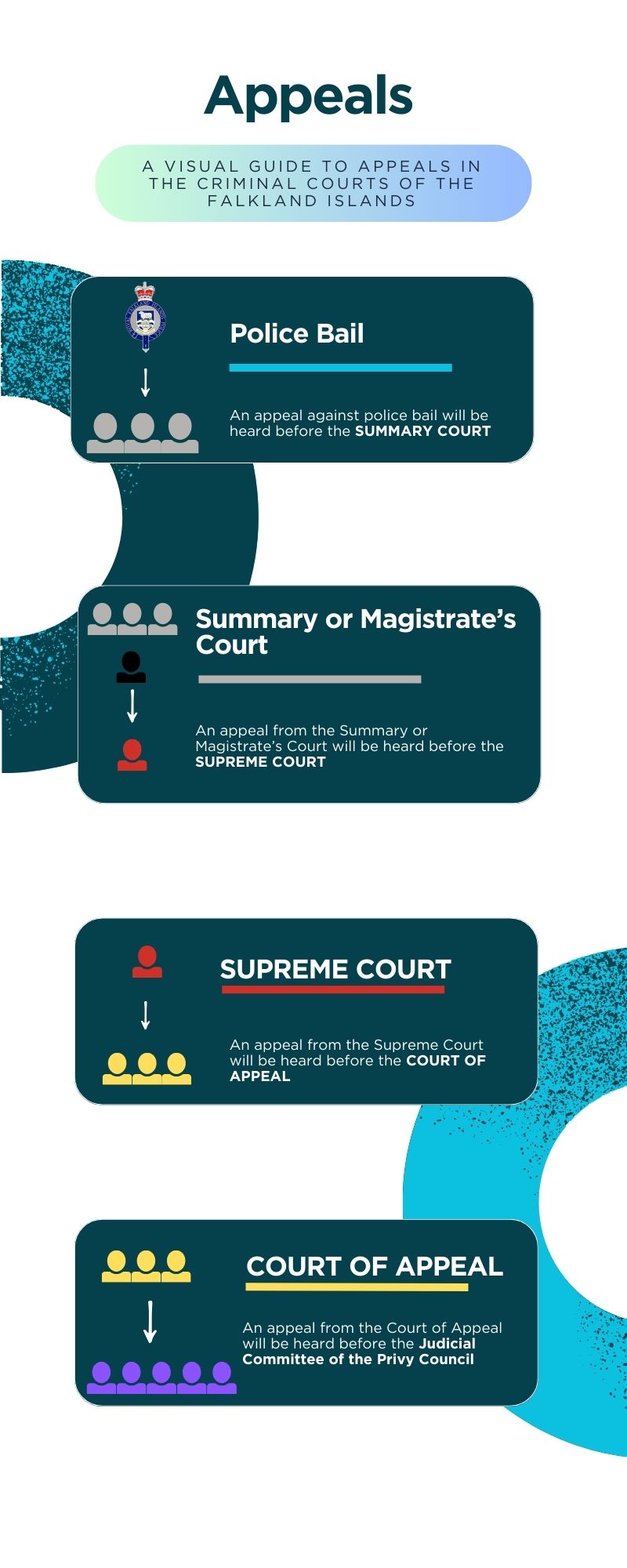Criminal Appeals
This page will provide information about where appeals will be heard, how they will be heard and how to appeal a decision.
Appealing Police Bail
You cannot appeal police bail conditions but you may apply to have conditions varied. When you are notified of your bail conditions the custody officer is required to provide you with reasons for those conditions. You are able to request a custody officer reviews their decision. If the custody officer refuses to vary the bail conditions, or imposes new conditions, then you may make an application to the Summary Court or Magistrate's Court, to vary the conditions.
There is no further appeal after the court has made a decision unless there has been a material change in your circumstances (e.g. change of address/employment), or more than 28 days have passed and you have not been charged with an offence.
Appeals from the Summary Court or the Magistrate's Court
You may appeal your sentence (if you pleaded guilty) or your conviction and sentence (if you pleaded not guilty) to the Supreme Court. You must file your appeal with the Supreme Court within 21 days of the decision you are appealing. If you are appealing conviction and sentence, it is 21 days from the date of sentence.
To appeal a conviction you must have grounds to show that the conviction is 'unsafe'. To appeal a sentence you must have grounds to show that the sentence is 'manifestly excessive'.
An appeal before the Supreme Court is 'on the papers'. This means, the Chief Justice is given a bundle of documents from the original hearing/trial and will make a decision based upon those documents. The bundle may include;
- Interviews;
- Transcripts of evidence;
- Case law;
- Any new evidence that has come to light since the original hearing;
- Any evidence entered as exhibits from the original hearing/trial.
On appeal, the Chief Justice may:
- Quash a conviction and acquit you; or
- Uphold a conviction; or
- Substitute a conviction for a difference offence with which you may have been charged and brought before the Summary or Magistrate's Court for; or
- Order a retrial of the charge(s) before the Summary or Magistrate's Court; or
- Order a payment of costs; and/or
- Uphold the sentence given; or
- Decrease a sentence; or
- Increase a sentence; or
- Substitute a finding of 'not guilty by reason of mental disorder' for any sentence.
To commence an appeal you will need to complete Form NG and file with the Registrar of the Supreme Court.
Appeals from the Supreme Court
Appeal from Supreme Court as a Court of First Instance
You may appeal your sentence (if you pleaded guilty) or your conviction and sentence (if you pleaded not guilty) to the Court of Appeal. You must file your appeal with the Court of Appeal within 28 days of the decision you are appealing. If you are appealing conviction and sentence, it is 28 days from the date of the sentence.
To appeal a conviction you must have grounds to show that the conviction is 'unsafe'. If your grounds to show this are based on a matter of law you may appeal without leave. If your grounds are based on a question of fact or a mixture of fact and law, you must have leave from the Supreme Court or the Court of Appeal to bring your appeal.
To appeal a sentence you must have grounds to show that the sentence is 'manifestly excessive'.
An appeal before the Court of Appeal is 'on the papers'. This means the Justices of Appeal will be given a bundle of documents from the hearing/trial and will make a decision based upon those documents. The bundles may include;
- Interviews;
- Transcripts of evidence;
- Case law;
- Any new evidence that has come to light since the original hearing;
- Any evidence entered as exhibits from the original hearing/trial.
However, the Court of Appeal has some additional powers which include the power to order a witness to attend and give evidence, even if they did not give evidence at the original hearing/trial.
On appeal the Justices of Appeal may:
- Quash the conviction if they find the conviction is unsafe;
- Substitute a conviction for an alternative offence;
- Increase the sentence;
- Decrease the sentence;
- Modify the sentence;
- Order a retrial.
Further Appeals from the Supreme Court as an Appellate Court
It is possible to further appeal to the Court of the Appeal after a decision by the Supreme Court has been made on appeal. To do this, leave must be granted by either the Supreme Court or the Court of Appeal. Either court may only grant leave if they certify that there is a point of law of general public importance involved in the decision of the Supreme Court which ought to be considered by the Court of Appeal.
An application for leave should be made within 28 days of the decision of the Supreme Court.
Upon determination, the Court of Appeal may exercise any of the powers which the Supreme Court may have exercised when deciding the appeal.
Appeals from the Court of Appeal
Any appeal from the Court of Appeal will go to the Judicial Committee of the Privy Council. Please click here for more information.

